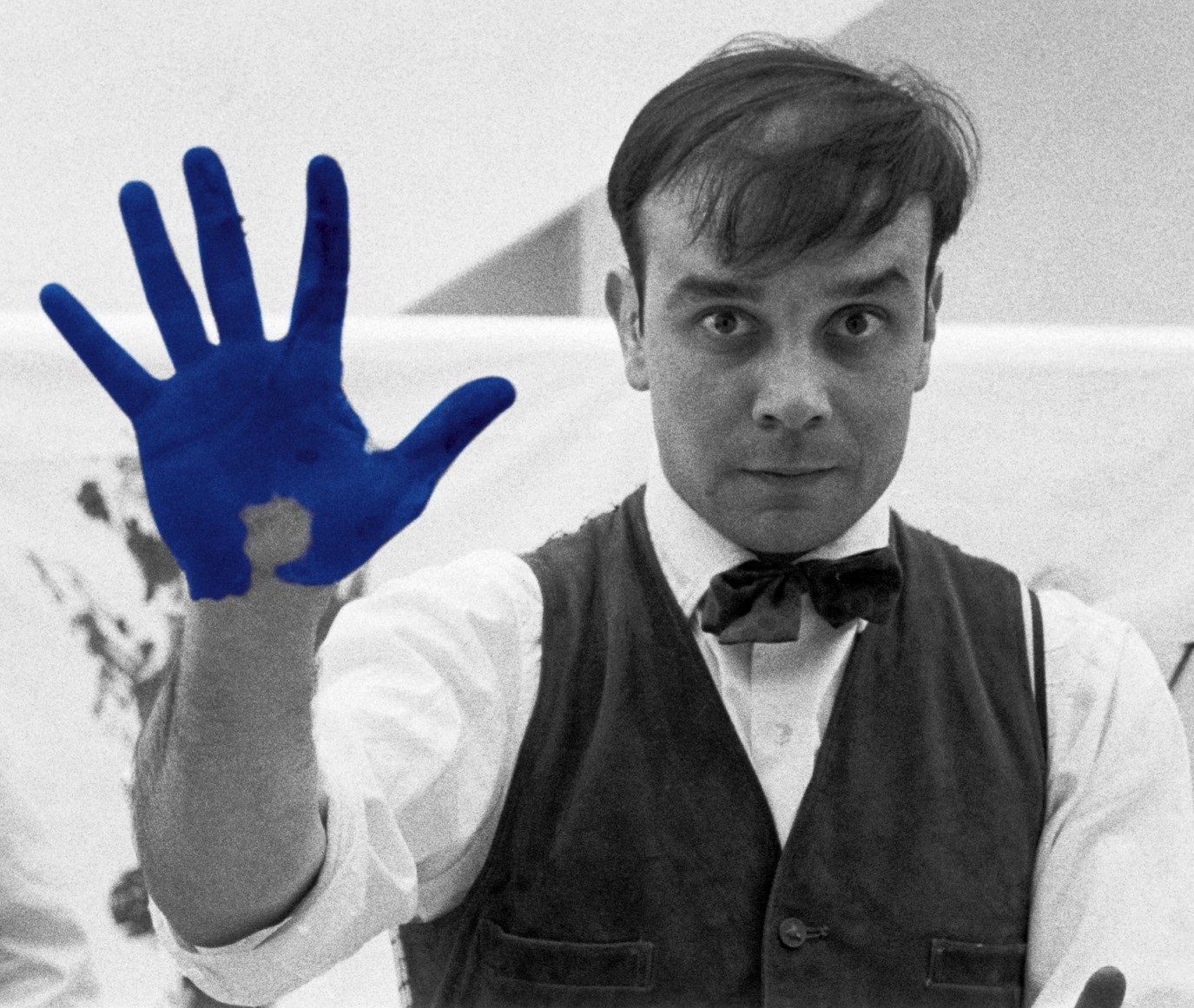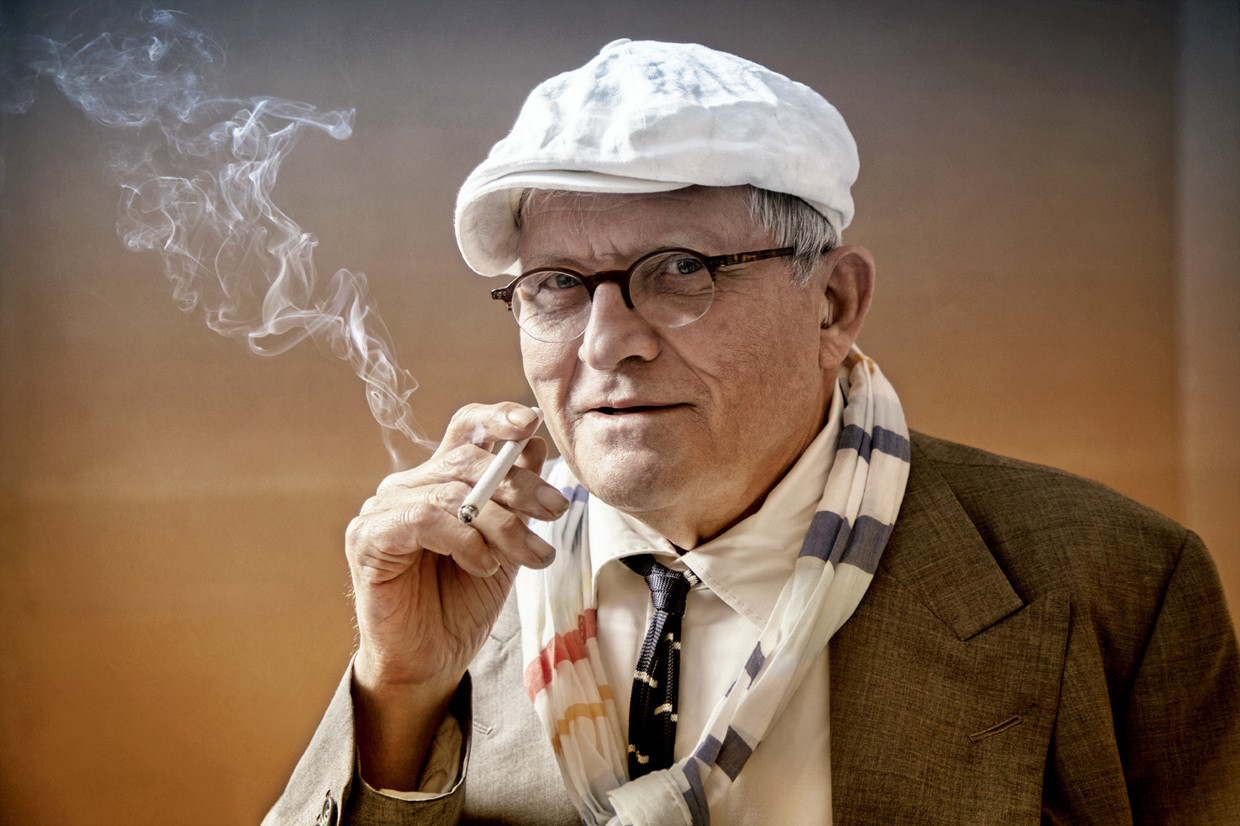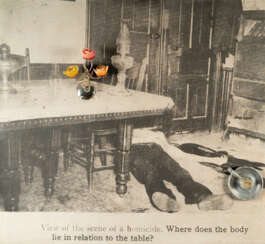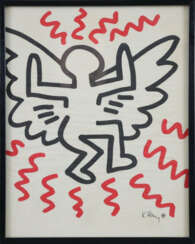offsetlithografie

Yves Klein was a French artist, renowned for his innovative use of pure color and his approach to the conceptual aspects of monochrome painting. Klein, born in 1928 in Nice, France, left an indelible mark on the art world despite his brief career, which ended with his untimely death in 1962.
Klein is best known for his invention of International Klein Blue (IKB), a deep blue hue which he registered as a trademark color and used extensively in his works. This vibrant blue, which he developed in collaboration with a chemist, represented more than just a color; it was a means of evoking the immateriality and boundlessness of space. His monochrome blue canvases, large-scale public performances, and pioneering works in performance art established him as a leading figure in the Nouveau Réalisme movement in post-war Europe.
Aside from his famous blue monochromes, Klein’s Anthropometries series, where he used nude women as 'living brushes' to transfer blue paint onto canvases, is another testament to his innovative artistic methods. These performances, often accompanied by a small orchestra playing his "Monotone Symphony" — a single, continuous note played for twenty minutes followed by twenty minutes of silence — challenged traditional perceptions of the artist's role and the creation process.
Visit our gallery's website to explore more about Yves Klein and sign up for updates on new acquisitions and exclusive auction events related to his profound legacy.

.jpeg)
Daniel Spoerri was a Swiss artist of Romanian-Jewish descent, renowned for his contributions to the art world as a key figure in the Nouveau Réalisme (New Realism) movement. Born in Romania in 1930, Spoerri made significant strides in visual art, particularly in his development of "snare-pictures," a method where he captured a group of objects, such as table settings and the remnants of meals, in a state of apparent disorder yet meticulously fixed to the tabletop.
His works are celebrated for turning ordinary moments into a tableau of frozen time, capturing life's ephemeral qualities through the permanence of art. Notably, his piece "Tableau piège" involves the fixation of objects to a board or table, which is then displayed vertically, challenging traditional art display norms and viewer perceptions. This innovative approach allowed him to explore themes of consumption, waste, and the mundane, making the everyday profound.
Daniel Spoerri's art is housed in many esteemed institutions, including the Museum of Modern Art in New York and the Centre Georges Pompidou in Paris. His work continues to influence contemporary art, offering a unique perspective on the art of assemblage and the beauty in the banal.
For those interested in exploring more about Daniel Spoerri's life and works, or in keeping updated with sales and auction events related to his art, signing up for our updates is highly recommended. This subscription ensures you stay informed about the latest offerings and exhibitions featuring Spoerri's intriguing creations.


Günther Uecker is a German sculptor, op artist and installation artist.


David Hockney, a British artist, has been a prominent figure in the art world for over six decades, renowned for his contributions to painting, drawing, printmaking, photography, and video art. His exploration of these mediums has made significant impacts on the Pop Art movement and beyond, making him one of the most influential artists of the 20th and 21st centuries. Hockney's work is celebrated for its vibrant color palette, emotional depth, and innovative use of technology in art.
One of Hockney's most distinctive features is his ability to blend traditional techniques with modern technology, notably in his iPad drawings and photographic collages. This fusion not only showcases his skillful adaptation to contemporary mediums but also highlights his ongoing quest to explore the nature of seeing and representation in art. Hockney's landscapes and portraits, characterized by their bright colors and meticulous detail, invite viewers to see the world through his unique perspective.
Significant works by Hockney, such as "A Bigger Splash" and "Portrait of an Artist (Pool with Two Figures)," are housed in major museums and galleries worldwide, attesting to his global influence and appeal. These pieces, among others, demonstrate Hockney's mastery over space, light, and narrative, securing his position as a pivotal figure in modern and contemporary art.
For collectors and experts in art and antiques, Hockney's oeuvre presents a fascinating study in the evolution of visual arts. His work not only offers insight into the artist's personal vision but also reflects broader cultural and technological shifts in society. As interest in Hockney's art continues to grow, keeping abreast of new sales and auction events becomes increasingly valuable.
To stay informed about the latest David Hockney sales and auction events, sign up for our updates. This subscription ensures that you receive timely notifications about new product sales and auction events related to David Hockney, offering unique opportunities for collectors and enthusiasts alike.













